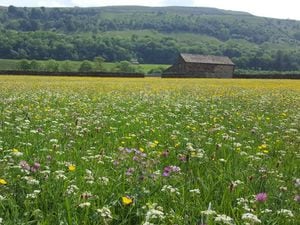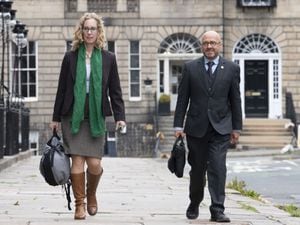Call to pay farmers £3bn a year to deliver for wildlife and climate
Conservation groups say current levels of EU subsidies need to be reinvesting in nature-friendly farming after Brexit.

At least £3 billion a year is needed to deliver nature-friendly farming across the UK which restores wildlife and tackles climate change, conservationists have said.
The RSPB, National Trust and the Wildlife Trusts warn a long-term financial commitment to land managers is needed for the UK Government and devolved administrations to meet commitments to restore the natural world and cut greenhouse gas emissions.
With Brexit, the current EU-wide subsidy regime, which mainly pays farmers for the amount of land they have, will have to be replaced.
In England, the Government has said it wants to switch to a system which pays farmers for delivering public goods such as wildlife habitats, carbon storage and flood prevention.
The three major conservation charities say the £3.2 billion spent UK-wide on farm support and environmental payments under the EU system must be re-invested in helping farmers produce food in a way that helps nature.
Their call comes after independent analysis for the groups concluded the new proposed “environmental land management” schemes and other measures to support nature-friendly farming would cost at least £2.9 billion across the UK.
The money is needed to pay farmers to help boost farmland wildlife such as lapwings, hares and pollinating insects, and create and enhance habitats including wildflower meadows, peatland and woodlands, they say.
Funding is also needed to help farmers protect soils, important for storing carbon, producing food and ensuring healthy natural systems, and cut emissions by restoring wetlands and planting trees and hedges.
That means guaranteeing funding for at least 10 years after the switch away from the EU’s Common Agricultural Policy (CAP) system, they argue.
Patrick Begg, from the the National Trust, said: “If the Government wants farmers to get on board with restoring nature it must provide the certainty and security of long-term funding, backed by first-class and first-hand advisory services.”
He urged ministers to guarantee the money to farmers “not just for the next one or two years, but at least the next decade”.
Ellie Brodie, from The Wildlife Trusts, said: “Nature is in big trouble, with one report after another highlighting steep wildlife declines.
“Farmers and land managers are uniquely placed to help it recover as they farm around three-quarters of our land.
“It’s crucial that farmers receive advice on how to help wildlife – as well as incentives to do the work required – but it needs to be paid for.
“Creating bigger, better natural habitats, boosting pollinators, investing in healthy soils, cleaning up polluted rivers, managing land upstream to stop flooding downstream and bringing back wildlife are all things that are good for farmers and good for the wider population too.”
Alice Groom from the RSPB said: “In the face of the climate and nature crises, every sector, including agriculture, must be supported to make the vital changes we urgently need to see.
“This research shows that we can re-invest the public money already spent on farming to deliver public goods through new nature-friendly farming policies.
“Backed by strong legislation, this will provide certainty to our farmers and land managers that they will be rewarded for the positive role they play in restoring and enhancing our natural environment.”
The organisations want to see a strong Environment Bill which contains ambitious targets to help nature recover and an Agriculture Bill, which did not become law as Parliament was prorogued, to ensure farmers are paid for delivering public goods.
Cambridgeshire arable farmer and chairman of the Nature Friendly Farming Network Martin Lines said: “We can only guarantee long-term food security and respond to the climate emergency by protecting and managing our natural assets.
“The £3 billion outlined in this new research is a good first step, but if we’re serious about turning things around to recover the natural environment we need to move quickly.
“Regardless of future agricultural policy, a clear investment strategy from Government is urgently needed.”
A spokeswoman for the Environment Department said: “When we have left the EU on October 31, we will create an ambitious new system based on paying public money for public goods.
“This will help our farmers become more profitable while sustaining our precious environment and tackling the effects of climate change.
“We fully recognise the concerns felt by farmers which is why we have already confirmed that we will maintain the same cash total in funds for farm support until the end of Parliament as well as guaranteeing funding for projects that are approved by the end of 2020 as part of the Common Agricultural Policy.”





